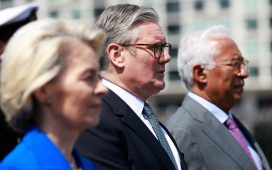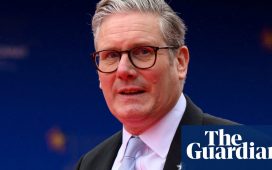Rishi Sunak to be interviewed by Laura Kuenssberg as Tory conference opens
Good morning. Rishi Sunak is in Manchester for his first Conservative party conference as leader. Given there is talk of next year’s conferences being cancelled to make time for an autumn election, it is not impossible that it will be his last. He is determined to use this as a reset moment, which is why there has been a hyperactive bout of policies being announced or floated over the last fortnight, but the electoral outlook is grim. Three developments in the news as the event opens show just how bad things are.
1) The opinion polls suggest recovery is near impossible. Some polling companies have picked up a Conservative bounce since Sunak gave his net zero speech, delaying some green measures, but other pollsters are showing no gain at all and, overall, the situation remains very bleak. Today the Observer publishes Opinium polling suggesting that a third of those who voted Conservative in 2019 now intend to switch to other parties.
And the Independent has published an article by Prof Sir John Curtice, Britain’s leading psephologist, in which he says:
The party finds itself on average 18 points behind Labour in the polls – little better than the position 12 months ago after Liz Truss was displaced as prime minister by Rishi Sunak …
The Conservatives appear to be heading unwaveringly on a course that leads towards heavy defeat in an election that is now at most little more than a year away.
2) Cabinet ministers are already preparing for the next leadership contest. Sunak wants to use Manchester to show that there is more to him than dull managerialism and that he has a vision for how he wants to change Britain. But there is some evidence that the party, and the media, are more interested in who comes next. The Sunday Times and the Mail on Sunday are splashing on interviews with Kemi Badenoch, the business and trade secretary, and Suella Braverman, the home secretary, respectively. Badenoch and Braverman are two of the favourites to succeed Sunak.
3) Conservative MPs are going rogue over tax. As conference starts, more than 30 Tory MPs have signed the “tax pledge”, promising not to vote for any more taxes that would raise the overall tax burden. Sunak wants to bring down taxes, and so theoretically this is in line with party policy. But promising to lower the tax burden in all circumstances is similar to the policy that William Hague was forced to abandon when he was Tory leader. He accepted the policy was unrealistic, because in some economic circumstances taxes have to go up. Liz Truss, the former PM, is among the Tories who has signed the pledge.
A stronger leader would be able to tell MPs like Truss that if they want to be candidates at the next election, they should be bound by the party’s manifesto, not a pledge drawn up by Sir Jake Berry. But Sunak does not have the authority to stop this, just as John Major could not stop many Tory candidates pledging in the 1997 election never to back joining the single currency, even though Major, and the official party manifesto, did not rule this out.
Sunak is doing a major interview this morning with Laura Kuenssberg, so we may hear his response.
Here is the agenda for the day.
8.30am: Michael Gove, the levelling up secretary, and Dame Priti Patel, the former home secretary, are interviewed on Sky’s Sunday Morning with Trevor Phillips.
9am: Rishi Sunak is interviewed on the BBC’s Sunday with Laura Kuenssberg.
Lunchtime: Gove and Gillian Keegan are among the cabinet ministers taking part in fringe events. Ben Houchen, the Tees Valley mayor, is also speaking at a fringe event.
2pm: Greg Hands, the Conservative party chairman, opens the conference.
2.15pm: Chris Heaton-Harris, the Northern Ireland secretary, opens a session on Scotland, Wales and Northern Ireland. There are also contributions from Andrew RT Davies, the Welsh Conservative leader, David TC Davies, the Welsh Secretary, Douglas Ross, the Scottish Conservative leader, and Alister Jack, the Scottish secretary.
3.30pm: Grant Shapps, the defence secretary, speaks.
3.30pm: Susan Hall, the Conservative London mayoral candidate, speaks at a fringe event.
3.45pm: James Cleverly, the foreign secretary, speaks to the conference.
5pm: Gove and Tom Tugendhat, the security minister, take part in a fringe event on the future of Conservatism.
If you want to contact me, do try the “send us a message” feature. You’ll see it just below the byline – on the left of the screen, if you are reading on a laptop or a desktop. This is for people who want to message me directly. I find it very useful when people message to point out errors (even typos – no mistake is too small to correct). Often I find your questions very interesting, too. I can’t promise to reply to them all, but I will try to reply to as many as I can, either in the comments below the line; privately (if you leave an email address and that seems more appropriate); or in the main blog, if I think it is a topic of wide interest.
Key events
Here is the word cloud from the BBC’s Sunday with Laura Kuenssberg showing people words people associate with Rishi Sunak.
Gove says cutting inheritance tax should not be priority, arguing reducing income tax or NI should come first
This is what Michael Gove, the levelling up secretary, said in his Sky News interview about tax.
I would like to see the tax burden reduced before the next election.
It’s for the chancellor and the prime minister to decide. My own view is that wherever possible, we should cut taxes on work. In other words, we should incentivise people to work harder, we should make sure that they’re better rewarded for the enterprise, the effort, the endeavour that they put in.
Sunak is reportedly considering cutting inheritance tax because it is one of the most unpopular taxes with voters, even though only a tiny proportion of people who inherit money or property are affected by the tax because the threshold is high enough to exclude most estates. Most Tories are strongly in favour of cutting inheritance tax, but Gove, whose parents were not wealthy, has always been more sceptical.
I would gently disagree with the IFS. In the past I’ve taken issues with some of these organisations with acronyms that have got things wrong in the past … They are making a projection.
Gove said he accepted taxes were higher than he would like. But he said that was mainly because of Covid and the war in Ukraine.

Q: Can you cite anything about Keir Starmer that you admire?
Sunak says he does not want to talk about personalities. He says he is setting out his vision for Britain. You have to take a stand on things, he says.
I don’t expect everyone to agree with me on everything, but people will have a clearer idea of what I believe what I stand for, and the direction in which I want to lead the country. I don’t think actually saying nothing, hiding, is the right type of leadership. I think that’s an abdication of leadership, quite frankly.
And that’s the end of the interview.
Sunak stresses he wants to do things differently.
Kunessberg shows Sunak a word cloud showing what words people think of first when they think of Sunak. “Rich”, “Himself”, “Money” and “The rich” are some of the most common responses.
Sunak says he is focusing on delivering for people. He cites the net zero changes as an example. He says people will save £5,000, £10,000, £15,000 from the changes to the boiler rules he announced.
Kuenssberg says these figures are disputed. Relatively few people might be affected, she suggests.
Sunak criticises Kuenssberg for saying inflation was not a tax. But it is a tax, he says, because it increases costs for ordinary people. Kuenssberg points out, rightly, that cutting inflation is not a tax cut.
Q: Will you commit to cutting tax before the election, as Michael Gove is calling for?
Sunak says the best tax cut he can offer now is to halve inflation.
Sunak claims Iceland boss criticising Tories is aggrieved he was not chosen as candidate
Kuenssberg shows Sunak a clip of Richard Walker, the head of Iceland, and until now a Tory supporter, saying the Conservative party is “out of touch with the needs of business, of the environment and the everyday people my business touches and serves”.
Sunak says Walker wanted to be a Tory candidate. He implies Walker has a grievance.
Kuenssberg says businesses are concerned about the uncertainty around HS2. That affects investors, she says.
Sunak insists that businesses are happy to invest in the UK.
Sunak again refuses to say if HS2 extension to Manchester will go ahead
Q: Will HS2 come to Manchester?
Sunak says he will not comment on the speculation.
Q: You are PM. This is not speculation. You are the PM. It’s your decision. Will it happen or not?
Sunak says there are spades in the ground. He is not going to comment on speculation.
Just today the government has announced a plan to help towns level up, he says. (See 8.54am.)
Q: A Conservative government told councils to bring in clean air zones. A Conservative mayor introduced Ulez in London. And Conservative councillors are introducing 20mph speed limits. You have come to this lately, haven’t you?
Sunak says as chancellor he cut fuel duty.
He says he charted a new course on net zero. That was not “some knee-jerk reaction to the Uxbridge byelection”. He had been concerned about the impact of the net zero policy for some time, he says.
Q: But you supported the net zero targets when Boris Johnson introduced them. Did you have concerns about them then?
Sunak says he raised concern at the time about this.
He says, when a carbon budget is set, the country should consider what policies are needed to achieve this.
He wants to be different, by being honest with people about the upfront changes that will be required.
Q: Almost all environmental experts says that your net zero changes will slow down the progress to net zero, and that you are doing this for political reasons, because net zero is unpopular with some of your party.
Sunak says that is not the case. The UK is decarbonising faster than other countries, he says.
Q: The watchdog says you are off track.
We’re not, says Sunak. He says the UK can meet these targets in a more proportionate way.
If people disagree, they must explain why it is right to impose costs on families.
The Rishi Sunak interview is starting.
Q: One of the councils declaring a 20mph limit is Cornwall county council, which is Tory. Are they declaring a war on motorists?
Sunak says many motorists feel that life if being made more difficult for them.
Q: Will you stop Tory councils doing this?
Sunak says his motoring plan is about ensuring things are done with residents’ consents. They can’t be part of a “war on motorists”. He says policies like blanket 20mph limits and Ulez are not right for the people.
Q: Will you stop councils introducing 20mph limits as a default?
Sunak says the government will make sure the guidance going to councils is clear. Councils have to act with the support of their communities.
Q: And if they have consent, they can act?
Sunak says the guidance will be set out soon.
He says the number of people signing a petition against this in Wales shows how strongly people feel about this.









